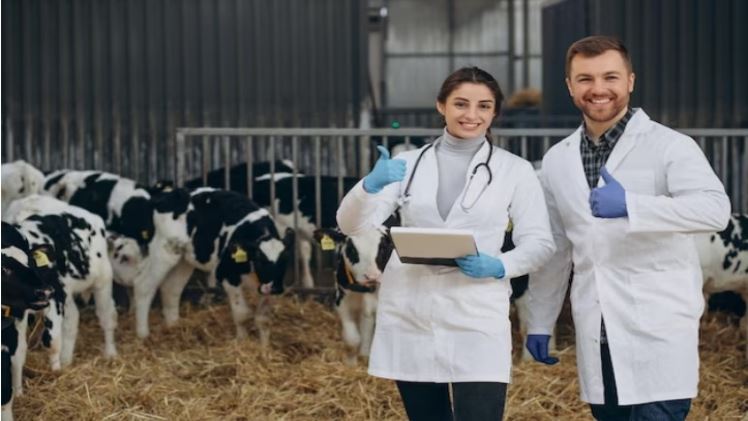How to Improve the Overall Health of Dairy Animals?

Raising calves requires consistent newborn protocol and care plan, reducing illness and death rates. Proper management and understanding of calf growth, nutrition, health, and behaviour can help minimise disease exposure, improve health, increase survival, and enhance growth rates.
So, Dairy farmers collaborate closely with their staff and a network of specialists to ensure that their cows receive proper nutrition and medical attention, among other things, to keep them comfortable and healthy.
Inspecting Cows Closely
You should constantly inspect cows, so you maintain a careful watch on each one of them. Some indicators, such as drooping ears, could indicate a cow’s illness. If so, you can help her get better by taking the necessary actions in the future.
Ensure that a cow heals after giving birth; this also entails keeping an eye on the cow that has recently given birth by taking note of her temperature and listening to her stomach.
Calf feeding practices
Either remove the calf from the cow and its maternity region immediately or clean the cow’s teats before it nurses.
Feed premium colostrum to calves by hand as soon as feasible.
Give your calf water, a milk replacer, and a new, clean starter every day. Make certain to provide water at least twice a day. Place these outside the pen to lessen the contamination from dung and urine. Additionally, this will keep water and spilt feed away from the calf’s bedding.
Ensure the calves’ diet, which includes grain, forage, and liquid feed, is of the highest calibre during the preweaning phase. Poor nutrition between the time of weaning and six months of age, according to research, can result in these animals having, on average,
- A 4.5-month gap in the first calving’s age
- slowed growth rate
- higher chance of being killed off as a cow
Bedding
A major factor in calf comfort is bedding. During the early preweaning period, bedding management is crucial. A sizable, dry pile of soft material can:
Provide a nice place to rest.
Assist calf hygiene.
Serve as a medium for absorbing moisture.
Reduce the likelihood of illness.
Lessen your tension.
Housing
The main dairy housing barn and the calf housing should be divided, with their ventilation systems. To keep flies at bay, always keep windows and ventilation inlets covered.
Proper Diet & Water
To maximise a cow’s milk production and reproductive function, clean, safe water is essential. Cows require clean water for healthy digestion, optimal feed movement through the digestive tract, optimal nutrient absorption, adequate blood volume, and tissue needs.
Nutrients & Supplements
Most rations require the addition of concentrated sources of certain minerals since pastures frequently lack multiple elements compared to the NRC requirements. All dairy cows need minerals, yet most feeds don’t include enough to support healthy growth or high milk output.
Specifically formulated to give dairy cows all the phosphorus and calcium they need for maintenance and milk production, Maclik Super is a mineral supplement.
Microbial supplements improve dairy cows’ digestive efficiency, gut microbiota balance, and overall well-being by breaking down complex feed components, promoting nutrient absorption, supporting immune function, and promoting weight maintenance. They also improve reproductive performance and milk production.
When it comes to dairy herd management, implementing focused solutions like dairy cow microbial supplements becomes essential to creating a safe and effective atmosphere. These supplements also address certain dietary requirements, which help maximise the herd’s general well-being and productivity.
